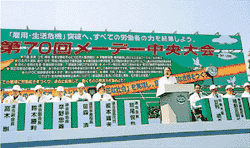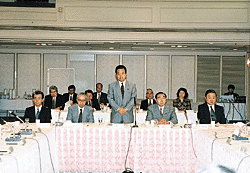
Seventyth May Day Celebration
| 10 | For Better Labor Relations |
|---|
The maintenance of sound and stable labor relations forms the basis for Japanese economic and social development, and therefore we must make further efforts to stabilize labor relations.Particularly in recent years, the environment surrounding Japanese labor and management has been changing drastically, with fewer children per household and the rapid aging of the population, globalization of the economy and progress of deregulation.In order to deal adequately with such changes in social and economic conditions, it is necessary for both labor and management to first recognize their social responsibilities, and try to reach a peaceful settlement of problems through voluntary dialogue between them, based on a spirit of mutual understanding and cooperation.
The Ministry of Labour has been promoting various measures from this viewpoint.Considering, in particular, that it is important to promote dialogue between labor and management at various levels, including that of industries and individual enterprises, the Ministry has been endeavoring to form better relations through the Industry and Labor Round-table Conference.

Seventyth May Day Celebration
| Characteristics of Japanese Labor Unions |
|
The number of Japanese workers in trade unions is about 12,090,000, or about 22% of all employees.Generally speaking, trade unions in Japan are basically organized at the level of each enterprise.These enterprise-based unions are then grouped into industrial federations and centralized national labor organizations, such as Rengo (Japanese Trade Union Confederation). |
| I. | The Industry and Labor Round-table Conference |
|
In view of the importance of industry and labor problems in our country's economic development, the Industry and Labor Round-table Conference is generally convened once a month, to provide a forum for talks among top leaders of the government, labor and management, as well as other knowledgeable and experienced people, to obtain their opinions concerning industry and labor policies and enlist their cooperation, and also to gain better mutual understanding among the parties concerned. |

220th Industry and Labor Round-Table Conference
(May 27,1999)